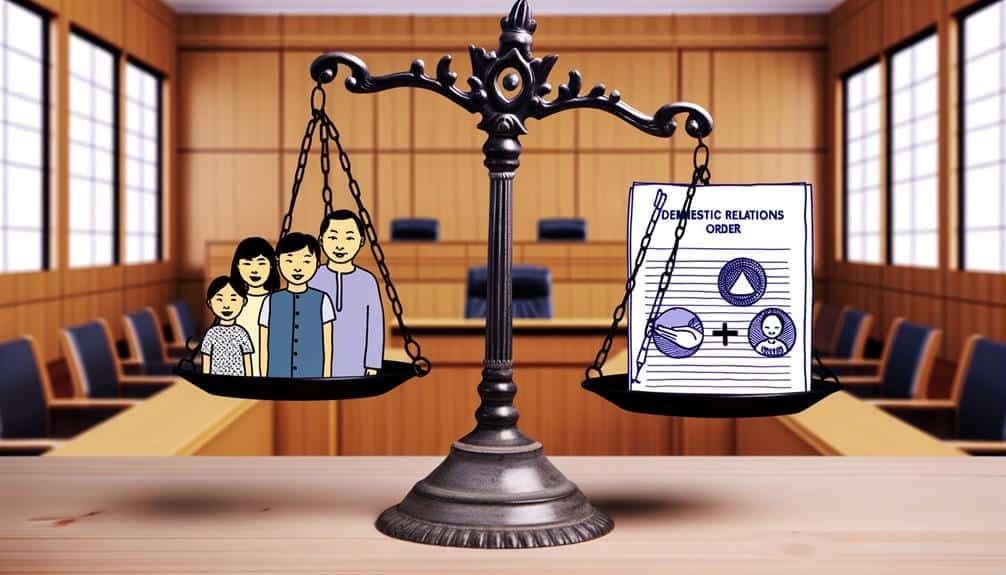
In the domain of family law, a critical yet often misunderstood role is that of the Dispute Resolution Officer (DRO).
As experienced family law lawyers, DROs act as mediators during case conferences, especially in Motions to Change, aiming to facilitate resolution outside the traditional court environment.
This role not only impacts the efficiency and outcome of proceedings but also directly influences the dynamics between the parties involved.
As we investigate further into the topic, we shall explore the complexities and benefits of the DRO program, expanding our understanding of its vital role in family court.
Key Takeaways
- A DRO (Dispute Resolution Officer) in Family Court is an experienced family law lawyer appointed to assist in resolving issues in Motions to Change.
- DROs facilitate case conferences, identify issues, explore possible settlements, and ensure proper evidence submission to promote cooperative decision-making.
- The DRO program is cost-effective, helping about two-thirds of cases settle without proceeding to a judge and increasing the court’s efficiency.
- DROs play a crucial role in child support and parenting plan alterations, assisting clients facing challenges such as parental alienation.
Defining the Dispute Resolution Officer (DRO)
In the domain of family law, a Dispute Resolution Officer (DRO) serves as a pivotal figure whose role encompasses mediating, facilitating, and streamlining Case Conferences, particularly for Motions to Change. These officers are experienced family law lawyers, entrusted with the responsibility of handling cases aiming to alter final Orders or Agreements.
The primary function of a DRO is to assist in identifying key issues, fostering settlements, and determining the requisite disclosure. Their ultimate objective is to facilitate agreements without the need for a Motion or trial. In addition, in situations where a settlement is not reached, a DRO plays an essential role in resolving any outstanding disclosure issues.
Their contribution to the legal process is invaluable as they help expedite case proceedings and enhance the court system’s efficiency. Their expertise and guidance offer a structured and cost-effective approach to dispute resolution.
The DRO Program and Its Benefits
The DRO program in family court provides a multitude of benefits, particularly in promoting amicable resolution and understanding of the legal process amongst disputing parties. Its primary goal is to foster constructive dialogue and encourage agreements without the need for a lengthy and contentious trial.
DROs utilize their expertise to identify issues, explore potential settlements, and determine necessary disclosures. This aids in streamlining the process and reducing the time spent in court. It’s important to note that while DROs don’t make orders, they prepare detailed reports for a judge’s confirmation, thereby ensuring a smooth change if a case proceeds to court.
The program is cost-effective and efficient, reducing the financial burden on the parties involved. Additionally, the confidentiality of DRO sessions allows open and honest discussions without the fear of such discussions being used against a party in court.
Understanding Family Law Case Conferences
Family law proceedings typically commence with an important step known as a Case Conference, a formal gathering that provides the first opportunity for the involved parties to present their cases to the Court. This is a critical juncture in the legal process as it sets the stage for the case’s trajectory and allows for the detailed examination of the case’s strengths and weaknesses. It is also at this point where relevant disclosures are obtained.
The Case Conference for Applications is overseen by a Judge, establishing an early official legal engagement. Here, the parties are given the chance to present their arguments and concerns, facilitating a more transparent and thorough assessment of the case. This process encourages open communication and promotes a clearer understanding of the legal scenario by all involved.
A DRO plays a pivotal role in family law Case Conferences, especially in Motions to Change. As experienced family law practitioners, DROs assist in identifying the issues at hand, exploring potential settlements, and determining necessary disclosure. They aim to reach agreements without proceeding to a Motion or trial, thereby saving time, effort, and resources for all parties involved.
How Can Understanding a DRO Help You Stay Calm During a Child Custody Battle?
Understanding a DRO, or Dispute Resolution Officer, can provide clarity and structure during a child custody battle. By recognizing their role in mediating conflicts and fostering compromise, you can focus on staying calm during child custody battles, prioritizing your child’s best interests while reducing unnecessary stress and emotional strain in the process.
The Role of Motions to Change
While the DRO plays a significant role in Case Conferences, their involvement becomes particularly important when it comes to Motions to Change in family law proceedings. These motions are typically brought forward when either party seeks to alter final Orders or Agreements due to changes in circumstances.
The function of the Dispute Resolution Officer in these situations is multifaceted and can be categorized as follows:
- Identifying Issues: The DRO aims to ascertain the key points of disagreement between parties, thereby setting the stage for a focused discussion.
- Exploring Settlements: Through their mediation skills, DROs facilitate negotiations with the intent of reaching amicable agreements that reflect the best interests of all parties.
- Determining Disclosure Needs: They help establish what additional information is needed for an informed decision-making process.
- Preparing Reports: If a settlement is not reached, the DRO prepares a report summarizing the issues and any disclosure deficiencies for subsequent judicial consideration.
Difference Between A Case Conference & A DRO Case Conference
Understanding the difference between a Case Conference and a DRO Case Conference is essential for managing the complexities of family law proceedings.
- Case Conference: This is the first step in family law matters, where a party may present their case to the Court. It serves as a platform to identify the strengths and weaknesses of each party’s case and may be held before either a Judge or a DRO, depending on the court’s jurisdiction.
- DRO Case Conference: This occurs when there is a Motion to Change an existing Order or Agreement. Here, the case conference is heard before a DRO, who, as a neutral third party with significant family law experience, assists in moving the case forward and aids in settlement discussions.
- Role of DROs and Judges: While both DROs and Judges help parties identify and resolve issues, only Judges can make orders related to the case, costs, and procedural steps. DROs, however, cannot make orders or decide on costs.
Tips for Successful Case Conferences
Drawing from the insights into the role of a DRO, it becomes clear that preparing for a Case Conference can be significantly influential in reaching a successful resolution in family law disputes. The Case Conference is a pivotal point where the disputing parties have their first interaction with the court system, and hence, it is important to make the most out of it.
Here are four essential tips for a successful Case Conference:
- Preparation: Understand your case thoroughly and prepare a concise, factual, and well-structured Case Conference Brief. This document is your first opportunity to present your case to the court, so make it count.
- Conduct: Maintain a respectful and professional demeanour during the conference. It is important to address the DRO directly and respectfully and keep in mind that these conferences are formal court proceedings.
- Cooperation: Show willingness to cooperate and negotiate. The DRO is there to help both parties reach an agreement, not to decide who is right or wrong.
- Focus: Stay focused on the main issues of the case, and be prepared to discuss possible solutions. Remember, the goal is to resolve disputes efficiently without proceeding to a Motion or trial.
Support from Spectrum Lawyers: Spectrum Lawyers, with their expertise in Alberta & BC family courts, can help maximize the benefits of the scheduled conference by appearing before DROs and Judges.
References
Government of Alberta, “Child Support Resolution Program” online: <https://www.alberta.ca/child-support-resolution-program> The Government of Alberta’s Child Support Resolution Program offers assistance to families navigating child support issues, including tools and resources to help resolve disputes amicably. These services are designed to prioritize the well-being of children while fostering collaboration between parents. For families in transition, the program also provides guidance on sensitive topics such as introducing a partner to your kids, ensuring that these introductions are handled thoughtfully to promote a positive adjustment for children.

We currently have three offices across Alberta — Edmonton, Calgary, and Red Deer. We serve the entire province of Alberta (and BC). We also have the infrastructure to work with any of our clients virtually — even the furthest regions of Alberta.
Call 1 (855) 892-0646 (toll free) to get routed to the best office for you or contact us online for general inquiries.
We also have a dedicated intake form to help you get the ball rolling. Our intake team will review your specific case and advise you on the next steps to take as well as what to expect moving forward. That’s the best way to schedule an appointment
Our offices are generally open 8:30 a.m.—4:30 p.m., Mon—Fri.


Ayesha Siddiqua
FAMILY LAWYER
Ayesha possesses an exceptional ability to put her clients at ease, driven by her active listening skills and adept problem-solving abilities. Her passion lies in practicing law and achieving favourable resolutions for her clients.
The Legal Review Process by Spectrum Family Law
- Spectrum strives for high-quality, legally verified content.
- Content is meticulously researched and reviewed by our legal writers/proofers (usually local law students).
- Details are sourced from trusted legal sources like the Family Law Act.
- Each article is edited for accuracy, clarity, and relevance.
- If you find any incorrect information or discrepancies in legal facts, we kindly ask that you contact us with a correction to ensure accuracy.


